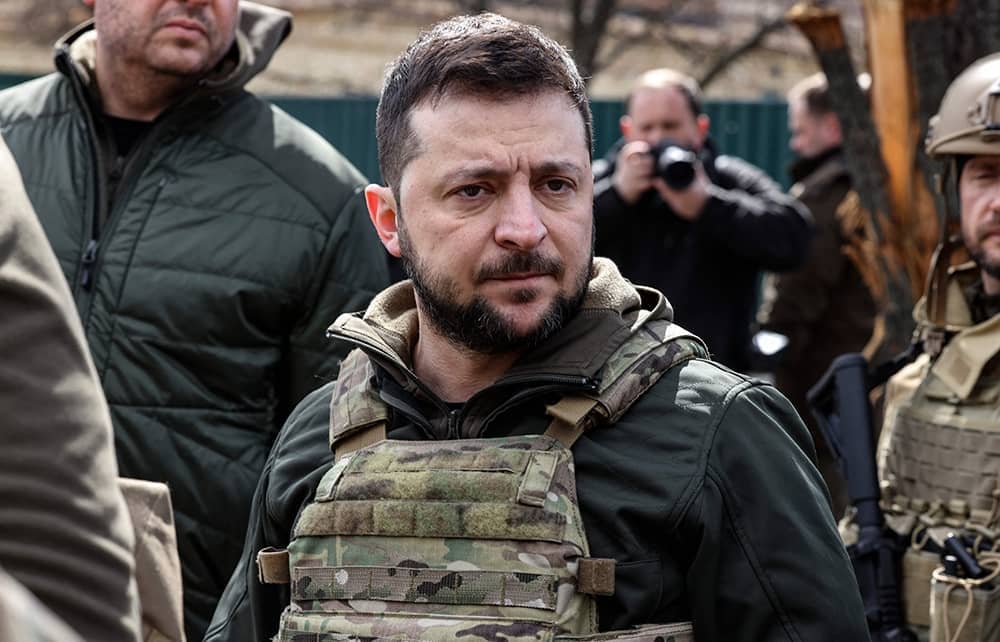When the Queen died, I was on my way to Kyiv. My mind focused on the war in Ukraine, I found myself uncharacteristically lost for words when I was asked to comment. I took refuge in the complexities of the journey, which involved a delayed flight from Rome to Lublin, a frantic drive to Chelm on the Polish-Ukrainian border, and then an overnight train through western Ukraine. It was a good excuse. The reality was I could think of nothing to say. I couldn’t have done an interview even if I’d been trapped in Broadcasting House.
Kyiv was, as NBC’s roving war correspondent Richard Engel had forewarned me, more exuberant than you might expect a capital city at war to be. The Battle of Kyiv was fought and won in the first phase of the war and now the fighting is to the south, around Kherson, and to the east, beyond Kharkiv. Central Kyiv looks positively cheerful. Only when you drive north-east, to the suburbs of Irpin, Bucha and Hostomel, do you see the blown bridges, destroyed houses, and burnt-out Russian armour. I am haunted by the simple memorial to the victims of Russian war crimes buried next to the Church of St Andrew and Pyervozvannoho All Saints in Bucha. It was only six months ago that they interred the bodies of more than 60 people here, many of them civilians executed in cold blood by Russian death squads. Ukrainian soldiers routinely refer to the invaders as ‘the orcs’. You soon see why.
There had been something thrilling about the train ride to Kyiv. Our group included old friends – Anne Applebaum, Radek Sikorski, Fareed Zakaria, Eric Schmidt – and there was a certain giddiness as we trundled eastwards in blacked-out sleeping compartments. Bucha jolted us out of that mood and prepared us for President Zelensky’s sombre message that a ‘winter of discontent’ was fast approaching, not just for Ukraine but for all of Europe. I’d met Zelensky before, five months after his improbable election in April 2019. I liked him. ‘Diminutive but energetic,’ I wrote, ‘he radiates ingenuous bonhomie.’ Over lunch, he confided that he had recently ‘had a very strange phone call with your president’. (The explosive readout of Donald Trump’s July call with Zelensky was released ten days later.) That night, by way of after-dinner cabaret, he appeared onstage with three other performers in his old comedy show. That jejune Zelensky has been entirely effaced by the war leader who on 24 February decided to stand and fight – ‘I need ammunition, not a ride’ – staking his life in what seemed to many a doomed last stand against the Russian imperial steamroller. In an age when the democratic world has grown accustomed to phony leadership, it gives you a jolt to encounter the real thing. He is a hero of our time, perhaps the hero.
British historians are supposed to know about their monarchy. Having once embarked on a history of the House of Saxe-Coburg and Gotha – as the royal family was known before 1917 – I ought to have been a fount of wisdom. But that book was never completed, despite many long hours in the Royal Archives at Windsor Castle. I moved to the United States nearly two decades ago and in 2018 I became a US citizen. Although we Britons are not obliged to relinquish our UK citizenship, I recall wincing when required, during the naturalisation ceremony, ‘absolutely and entirely [to] renounce and abjure all allegiance and fidelity to any foreign prince, potentate, state, or sovereignty’. The Queen was in my mind’s eye as I said those words. I consoled myself that this was one of life’s necessary white lies.
Yet dual citizenship is more disreputable than a white lie. It is a hedge. When farcical things occur in Britain – such as the opera buffa premiership of Boris Johnson – I am an American. When the United States is being embarrassing – as during Trump’s attempted autogolpe on 6 January – I switch. The Queen’s death found me out. It was not the pageantry of the past ten days, magnificent though it was, nor even the Lone Piper’s pibroch, so much as the recollection of her role in my family’s history. My grandfather Thomas Hamilton was a Labour man when she ascended the throne. His wartime service in the RAF in Burma and India left him with roughly Orwell’s views of the British Empire and establishment. Yet he always made us sit and watch the Queen’s Christmas message and stood to attention when ‘God Save the Queen’ was played. I have maintained that tradition, so even his youngest grandchildren grasped the significance of her death. To have been part of a nation in mourning must have been uplifting, too.







Comments